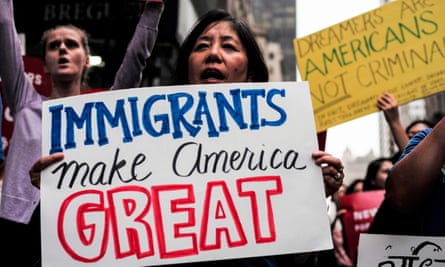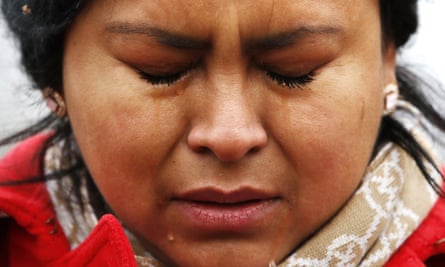In June of 2017, Erica enrolled in a Florida community college. With its breezy hallways, swaying palm trees and well-lit classrooms, the campus was a far cry from the factory that employs both her and her mother – a place where undocumented migrants continually fear Ice raids.
The factory was a dead end, a place of desperation; campus promised a brighter future. But the exhilaration Erica felt when she walked the campus turned to despair as she filled out her Free Application for Federal Student Aid (Fafsa).
To receive financial aid, she would have to include information about her parents on the form. While Erica – who, like all sources interviewed for this article, requested to be identified by only her first name– is a US citizen, her parents are undocumented immigrants from Mexico. Her mother had long been anxious living without papers, but it all got much worse when Ice picked up Erica’s older brother on their mother’s birthday a decade ago just as he walked out of a local grocery store, cake in hand.
Erica is one of the countless US citizens who face a catch-22 when they apply for federal financial aid: on the one hand, they must provide information about their parents on forms; on the other, they fear that doing so will alert authorities to their parents’ immigration status.
It’s a choice between, as some students put it, “ratting out” their family or giving up on higher education.
Michelle Lapointe, an attorney with the Southern Poverty Law Center, explains that under the Family Educational Rights and Privacy Act (Ferpa) there are “strict rules that protect the privacy of students’ information”. As she tells it, it would be a violation of the law for school officials to share information with immigration enforcement.
But many students like Erica aren’t aware of this. Even those who do know about Ferpa still fear putting their faith in a government that is increasingly hostile towards both immigrants and their children, even those who are US born.
In Erica’s case, her brother’s absence amplifies her fear.
Erica was in fifth grade when Ice deported her brother to Mexico, where he was born. She hasn’t seen him since. “We Facetime once in a while,” she says, “but it’s not the same.”
Erica’s mother remains heartbroken, Erica says: “It’s something we try not to talk about.” Still, every year on her birthday, Erica’s mother relives the trauma. So, when Erica, who hopes to become a mechanical engineer, asked her mother for the information she needed to fill out her Fafsa, her mother refused.
Completing the form, she worried, would lead to her deportation.
“She was scared. She was like, ‘Are you sure you can trust [the Fafsa] website? What if they’re trying to scan who’s undocumented and they’re trying to get to you or get to me?’”
Erica understood the concern. “What if they take her and leave us behind?” wondered Erica, who has two sisters – one older, who was born in Mexico and has Daca, and one younger, who is still in high school and has US citizenship – as well as a five-year-old brother who was born in Florida.
Still, she felt deep disappointment. The lack of a degree threatened her dream to work in engineering. “I don’t just want to work somewhere where I don’t get paid a lot for something I don’t like doing, you know?”
The prospect of being the first in her family to go to college also excited her. “I understand,” Erica says, “but then it was like ‘I really want to go to college’.”

With the fall semester approaching, her relationship with her mother frayed. For two months, Erica pushed her mother to provide the information she needed to complete her financial aid forms; for two months, her mother refused. Then Erica enlisted her older sister, the one with Daca status, to help.
Her sister couldn’t attend college because she’d applied in the early 2000s, when Florida’s colleges and universities still classified the children of undocumented immigrants as “out-of-state” for tuition purposes, making it prohibitively expensive. But because of her experience, she understands the system; she guided her mother through the Fafsa forms, assuaging her fears.
Finally, not long before classes began, Erica’s mother relented. Although she is undocumented, she pays taxes and provided her individual taxpayer identification number (ITIN) as well as proof of income. Erica remembers her mother telling her, “Just put whatever info they ask about me and from there if something happens” that she would deal with the consequences.
Erica ultimately received a Pell Grant, covering the cost of tuition.
(Every Florida college and university contacted for this story declined multiple requests to interview financial aid officers. The Florida State University Admissions Office however, did respond: “We work with individual students on a case-by-case basis to guide them through the financial aid process based on federal regulations.” Jody Glassman, director of university admissions at Florida International University replied, “We do everything possible for students under the law.”)
Some students are less lucky and don’t manage to file a Fafsa and end up forgoing aid altogether.
In his attempts to protect his undocumented father, Fernando, who is 21, also doesn’t have a driver’s license. He has spent years without health insurance as well, though he would probably qualify for Medicaid. Last summer, a medical emergency left him with a $90,000 hospital bill.
In essence, Fernando – a US citizen – lives as though he is undocumented himself.
Fernando’s story points to the larger issue of mixed-status families’ tendency to avoid contact with government agencies. According to Tanya Broder, an attorney with the National Immigration Law Center, “such families have long been leery about interactions with officials because they fear that that their privacy will be compromised and that using a program could affect their status, or will place a family member at risk”.
“This fear is widespread, affecting not only undocumented immigrants but many lawfully present immigrants and citizens who live in immigrant families,” Broder adds.
Under the current administration, families are more terrified than ever that they will be torn apart and in recent months, changes to the public charge rule have made immigrants even more concerned about any interactions with the government that might count as a strike against them on future applications for residency.

The results are disastrous.
Families who need food stamps to help feed their US citizen children are cancelling their benefits and falling into food insecurity, according to Naomi Tsu, an attorney with the SPLC. “Mixed-status families who are entitled to use things like food stamps fear that Ice will target them and take the parents and leave behind US citizen children,” Tsu explains.
Tsu also speaks of parents in Florida who pulled their young children out of a pre-K program out of fear that it would count as using public benefits. While working they left their children at home with their eldest child; when the building caught on fire, the children did not manage to make it out.
The fear that led the parents to take their children out of pre-K and driving others to cancel their food stamps is “common”, Tsu remarks.
Fernando hopes to become a child psychologist – a desire that stems from his hard upbringing in California. Shortly before his birth, immigration authorities detained then deported his father for “gang affiliation”. Barred from legally re-entering the US but determined to see his son, Fernando’s dad snuck back across the border. It took him years to return, however, and the two didn’t meet for the first time until Fernando was four.
Fernando’s mother, a native of El Salvador, worked low-wage, fast-food jobs. Mother and son moved constantly, and struggled with financial pressure.
Once outgoing and popular, Fernando became painfully shy. He gained weight and had trouble concentrating. Watching him struggle, his grandmother pushed him to enter therapy. Over time, it helped him overcome his problems; he now wants to give back to his community by helping other young children suffering from mental illness.

At 20, he decided to enroll in college to pursue his dream – and then it was time to fill out his Fafsa form.
Fernando lives with his grandmother, who is undocumented and who has never formally adopted him. For financial aid, he believed he was supposed to enter the information of the two people listed on his birth certificate: his mother and father.
“I needed my birth parents’ tax papers,” he says. Although his mother has US citizenship, she resides in California. Her tax papers, Fernando explains, “were all over the place because she is moving all over the place”.
While Fernando’s father, a landscaper, lives in Florida, he has been getting paid off the books since he re-entered the US almost two decades ago because he fears that paying taxes will cause another deportation.
In theory, Fernando could account for his father on the Fafsa by entering zeros where it asks for his dad’s social security number. But, he says that it is his father doesn’t want “authorities to know he’s here. My whole family is paranoid over it. When I went to apply for financial aid, my aunt told me ‘Don’t mention your dad.’”
Why didn’t Fernando just declare himself independent? Before age 24, students are considered, by default, to be dependent and are only considered independent in rare circumstances.
Fernando ended up paying for college out of pocket, but can only afford to enroll intermittently. He took his first class in the spring semester of 2017; his second in the summer of 2018. In the meantime, he works as a gardener. (As a big Bernie Sanders fan, he points out that if public college was free for all Americans – as Sanders advocates – he wouldn’t have to apply for financial aid in the first place.)
Though Fernando’s experience with financial aid hasn’t raised larger questions about his American citizenship, for Nicole, 18, the feeling that she has to hide her parents from authorities has left her feeling like a second-class citizen.
Nicole is the American-born daughter of two undocumented immigrants from Mexico. Her parents had one child there, a son; they moved to the US when their boy was two years old.
“My brother got here first,” Nicole says. “They sent [him] with a lady who was in charge of bringing over kids.”
As their son was spirited across the border, Nicole’s parents made the dangerous journey from Mexico overland, arriving about a month behind their child. When they went to pick up their son, he didn’t recognize them and hid behind the woman who had brought him into the country.
Nicole was born in Florida four years later.
Today, her older brother, who qualified for Daca, is studying civil engineering. Like Nicole, he started out at a local community college; it took him three years to get an associate’s degree, however, rather than the usual two. Because students with Daca aren’t eligible for federal financial aid, his mom and dad – a house cleaner and a handyman – paid his tuition.
Nicole, a US citizen who plans to become a neonatal nurse practitioner, receives financial aid – but only after plenty of soul searching.
As a first-generation college student and the daughter of immigrants who risked everything to come here, pursuing an education means a lot: “I have to do good because they did all of this for me. I have to give back.”
Nicole first worried about her parents being arrested on a recent afternoon, when her parents drove her to dance class. When she stepped outside the studio, she noticed two police cars and an unmarked car in the parking lot.
Nicole worried that her parents had been caught and started sobbing. She frantically called her mom who answered, “We’re not even there, we’re on our way.” She warned her parents not to come, but her parents still came to get her.
But when it was time to fill out her Fafsa, a few months later, they were frightened, leaving Nicole with a dilemma: “What am I supposed to put?”
Nicole recalls that the financial aid counselors at her community college advised her to use her parents’ names and put 000 for a social security number or ITIN.
Her parents didn’t want her to do even that. And Nicole was equally uncomfortable with the idea of putting 000 on her forms. In her mind, it meant informing on her parents. “These zeros are gonna mean a lot if I put them here. These zeros are going to show their status.”

Her maternal grandmother has residency; although Nicole’s family doesn’t live here, they use her address for all official documentation. Nicole ultimately listed her, and received financial aid.
Even though she got the funding she needed, the experience left Nicole with questions: “You know how at 18 we can vote? If I can vote, why can’t I naturalize my parents?”
“On paper I’m a citizen,” she explains, “but I have to hide certain things about myself. Am I really a citizen if there are certain things that I have to keep to myself in fear that the government is going to arrest my parents and take them away from me?’”
Under the Trump administration, Nicole has also become increasingly worried about whether or not she’ll be able to keep her US citizenship.
“Trump had something about ‘anchor babies’, how he wants to take away their citizenship and it’s like what would I do then if they took mine away?” Nicole says, referring to Trump’s call to end birthright citizenship as well as statements that he doesn’t consider Americans born to undocumented immigrants to be citizens.
“I was worried when I first heard that,” Nicole continues. “I was like, can they really do this? They can’t … right?”
This article was supported by the Economic Hardship Reporting Project and the Puffin Foundation.
